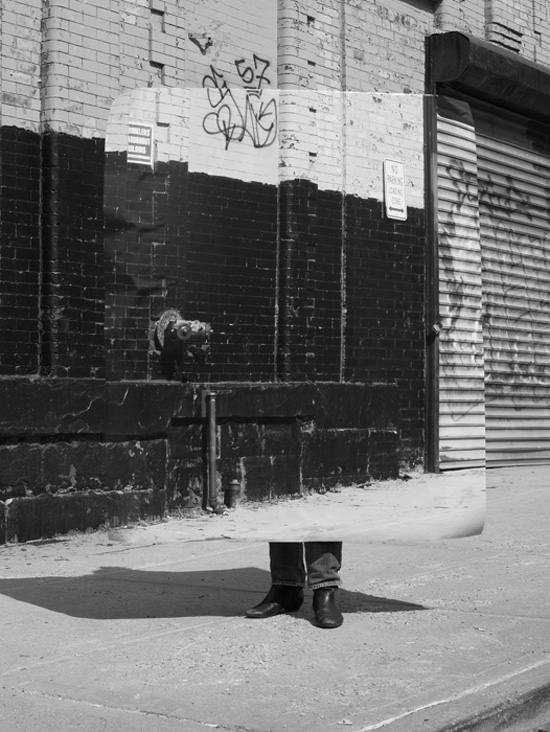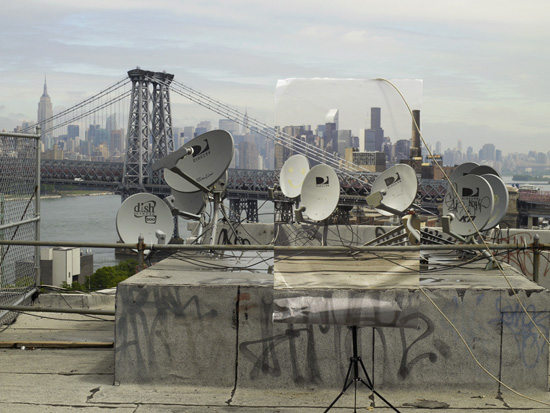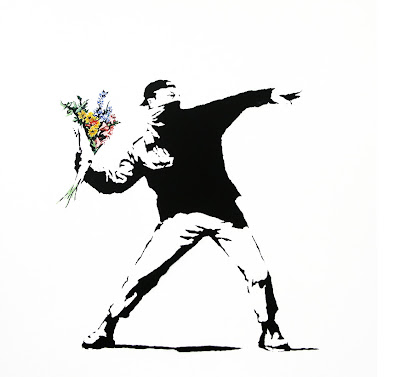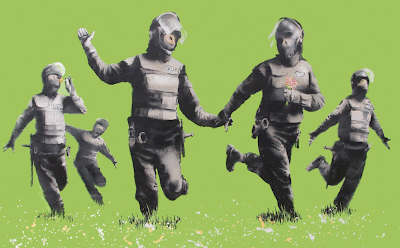Showing posts with label Did you know.... Show all posts
Showing posts with label Did you know.... Show all posts
Tuesday, April 26, 2011
When I grow up, I wanna be a... daisy!
Did you knowthat it only takes several hours for daisies to regrow after the lawn is mowed? Little fighters, I say...
Tuesday, April 5, 2011
Tuesday, December 28, 2010
Work Out Laundry
Awesome! Be good to your body, the planet, and get the laundry done simultaneously:
Tuesday, November 9, 2010
Beyond Untraditional
I wanna be a street artist when I grow up!! But use used up torn bags instead of new ones.
Sunday, June 13, 2010
I stick my emblem at you!!
 Designed back when Kikinda (currently in northern Serbia) was situated on the border with the Ottoman Empire, Kikinda's city emblem may be the scariest one out there. It must have originated as a proud symbol of resistance to the Ottoman oppression that had conquered Serbs for 600 years... But come on! Regardless of the charming heart below, a spear going through someone's head is definitely not a friendly way to welcome visitors to your city. It's 2010 and the media representation of Serbs does not ring friendly bells as is. The last thing we need is I "heart" Aggression emblems.
Designed back when Kikinda (currently in northern Serbia) was situated on the border with the Ottoman Empire, Kikinda's city emblem may be the scariest one out there. It must have originated as a proud symbol of resistance to the Ottoman oppression that had conquered Serbs for 600 years... But come on! Regardless of the charming heart below, a spear going through someone's head is definitely not a friendly way to welcome visitors to your city. It's 2010 and the media representation of Serbs does not ring friendly bells as is. The last thing we need is I "heart" Aggression emblems.Monday, April 26, 2010
"Super-duper-natural"
Yesterday, I went to a festival called Supernatural, where the point was to promote sustainability through amusement with various band and DJ performances. In order to enter, we had to swap 3 cans, 3 plastic bottles and 3 magazines for 1 ticket. Everything seemed so idyllic, the Kosutnjak forest was full of beautiful people throwing frisbee and playing badminton to electronic music. However, as the day unveiled, it started getting colder, the happy pretty people got drunker and the green surfaces turned gray. Covered with trash.
"Well, they're going to have people clean it all up afterward either way", a friend of mine tried to make me feel better.
That's not the point. If one of the goals was to acquaint the Serbian youth with one of the easiest forms of waste management, then why was it difficult to set up recycling bins apart from the ones behind the bars and the one set that I spotted at the very entrance of this large two-stage festival? Moreover, water was only sold in plastic bottles and the bartenders were given orders to pour it out of the plastic bottles into plastic cups. I saw the bartenders dispose the original drink beverages - cans, water bottles, juice boxes and other glass bottles - into recycling bins but what about all of the plastic cups? I found myself having to put them down on the grass upon finishing each and I am not sure if the cups that covered the grass by the end of the night were recycled. Regardless, we generated much more waste than needed.
I felt like a fool walking my way out of the forest and to the bus stop. This, too, was one of the ways to decrease waste. A great one, I must say. The festival was made to be inaccessible by cars and the visitors were pushed to walk to and from the party in the beautiful spring weather. As much as it "added to the experience" on the way there, it felt rather silly on the way back.
Thank you forest, I've trashed you, and now I am walking home to feel good about it all.
"Well, they're going to have people clean it all up afterward either way", a friend of mine tried to make me feel better.
That's not the point. If one of the goals was to acquaint the Serbian youth with one of the easiest forms of waste management, then why was it difficult to set up recycling bins apart from the ones behind the bars and the one set that I spotted at the very entrance of this large two-stage festival? Moreover, water was only sold in plastic bottles and the bartenders were given orders to pour it out of the plastic bottles into plastic cups. I saw the bartenders dispose the original drink beverages - cans, water bottles, juice boxes and other glass bottles - into recycling bins but what about all of the plastic cups? I found myself having to put them down on the grass upon finishing each and I am not sure if the cups that covered the grass by the end of the night were recycled. Regardless, we generated much more waste than needed.
I felt like a fool walking my way out of the forest and to the bus stop. This, too, was one of the ways to decrease waste. A great one, I must say. The festival was made to be inaccessible by cars and the visitors were pushed to walk to and from the party in the beautiful spring weather. As much as it "added to the experience" on the way there, it felt rather silly on the way back.
Thank you forest, I've trashed you, and now I am walking home to feel good about it all.
Saturday, April 10, 2010
Knitting 101
I spent the day learning how to knit from my friend's grandma. Here are some of the reasons why I am already addicted:
- The more "trades" you learn, the happier you will be. I just cured a kidney infection, which impacted me psychologically more than anything. I had to lay in bed for over a week (the only "walks" allowed were to the restroom). The fever, pain and nausea were so exhaustive that I had trouble comprehending whatever I attempted to read or watch. I keep thinking about how knitting would have given me a sense of productivity and a way to to pass the slow monotone days.
- My friend's grandma who is teaching us to knit has been successfully battling dementia through knitting and sewing. I believe this as I've witnessed it, but this is not an unexplored therapy method - here's an article that explains how knitting, and other similar cognitive activities, can be linked to the delay of memory loss.
- I know very few people my age (early twenties) who know how to knit. This gives me the feeling that, by the time we all become grandparents, knitting will be a virtually forgotten skill and hand-knitted products will probably be so rare that they will become valued and cool.
- The scarf I am making for my 1-year-old niece is going to be one of a kind and she is way too special to be bumping into random babies wearing the same outfit as her.
- Through knitting, I will be spending more time with my friend's grandma and there is quite a lot to hear and learn from her.
I love knitting and so will you!
Tuesday, March 30, 2010
DJ Mamy Rock - She loves to see the kids enjoy themselves!
 A new London diva has been born - Mamy Rock is a 70-year-old retired widow who, after attending her grandson's birthday party at a "disco", fell in love with electronic music and the dance culture. She put on a pair shades, big earings and a sparkly Adidas track suit and began DJ-ing. This reminds me of the women in Southern Serbia who launched a house painting business but also of my 87-year-old grandpa who, having heard some electronica from my computer, thought it was very "interesting and modern" music.
A new London diva has been born - Mamy Rock is a 70-year-old retired widow who, after attending her grandson's birthday party at a "disco", fell in love with electronic music and the dance culture. She put on a pair shades, big earings and a sparkly Adidas track suit and began DJ-ing. This reminds me of the women in Southern Serbia who launched a house painting business but also of my 87-year-old grandpa who, having heard some electronica from my computer, thought it was very "interesting and modern" music.Mamy Rock's style is a bit too commercial for my taste, but she seems to be very popular - she performed at the trendiest Cannes Film Festival parties. Not surprisingly, the night her grandson's birthday, when she had just been Ruth Flowers and not Mamy Rock, the bouncers gave her funny looks and tried to talk her out of entering the club.
Why do we slam doors on others, and ourselves, based on what "category" we belong in? When I was little, I dreamt of being a jokey or a cashier. Ever wonder what direction your life would have taken if it weren't for the clearly defined categories that mapped most of it out for us?
Wednesday, March 24, 2010
Camouflage and Other Hidden Art
I would love to take part in a disorienting art project in my city, similar to those of Fred Lebain or Liu Bolin. I will try to convince my friend Dana, who may be up for it, considering her Action. Reaction. Interaction. project for which she, among other things, "hijacked" the audience's direction by randomly placing fun directional arrows throughout London that eventually led to a sign bluntly announcing: GO BACK. PLAY. She explains it as:
Guiding people through the urban space, and surprising them by changing the signs, playing with arrows, is a system to analyze the politically coded society today. Challenging people’s senses, directional choices, trust, curiosity, behavior - in order to explore what makes sense for me, and how it can affect the others, and to make them become active: to play with the environment.
Lebain played with the New York audience by taking photos of certain spots, boosting them on posters and later aligning these posters in their original environment:



Liu Bolin from China does something similar - but with his body. With the help of his assistant (I wanna be someone's assistant on such a cool project!), Liu paints a part of an ambient on himself and then takes photos of his body picture blended with the real picture. Enjoy!


Monday, March 22, 2010
Forever Bottled
Happy World Water Day!
We are well aware of the implications of bottled water. It's a wasteful money making industry that has often been proven not to offer anything different or better than the free and local version - tap water. The Food and Water Watch draws attention to the fossil fuels, oil and enormous amounts of water used for the production of the water bottles while only a tiny fraction of them ends up being recycled. The rest gets trashed and, because plastic degrades so slowly, it is likely that every water bottle ever produced still exists in some pile of garbage, somewhere.
Having read about similar studies countless times, as I was throwing an old water bottle with a sip or two of "stale" water left in it out of my car, I couldn't help but wonder... How many times have I done this without having drank or at least poured out the left over water? I started noticing that many people around me do the same thing too. This must cause for thousands of gallons of water to be trapped in barely degradable plastic. So, not only are we polluting our water and slowing down its purification through the ecosystem, but we may be actually trapping huge amounts of it in bottles buried in trash, disabling it from entering the ecosystem. I would be very interested to see some studies on the relevance of this phenomenon.
Random thought... If somebody had told me when I was little that, one day, I would actually purchase water, I would've probably considered them mad. Then, life in Beijing in the 90's brought me to the realization that not all tap water is drinkable. So, we boiled and cooled tap water every evening and, as much as my memory serves me, I still had not heard of anyone buying water. When did the idea of packaging and selling water become acceptable? It seems like it took a rather small fraction of my life for me to get used to this folly... What's next? Purchasing packaged clean air?
Monday, March 15, 2010
Women with Newspaper Hats in Southern Serbia
A couple of days ago, Serbian media station B92 ran a report on a Kursumlijan woman's business start-up. With absolutely no work experience, 70-year-old Dragica Milanovic came to the idea of using a skill she has known since she was little. She trained a group of 10 unemployed women, gave them newspaper hats and launched a house painting business. The business has been so successful that it even won the tender to paint the City Hall. The article cited the workers' content after years of life on welfare. One woman claims how she only got into house painting as a means of survival but would never give it up now. Others say the money is good - enough to support their children as well.
Dragica Milanovic's conquest of a young men's profession is inspiring. Kursimlija is one of the poorest municipalities in Southern Serbia, which itself is an empoverished region in a transitional country. Word about Danica's business has spread to other towns in the region and, acknowledging the difficult economic climate, Dragica is looking forward to expanding and hiring additional workers outside of Kursumlija.
Things are moving, but slowly. Another report by Glas Javnosti had an advertisement right below the article stating:
Dragica Milanovic's conquest of a young men's profession is inspiring. Kursimlija is one of the poorest municipalities in Southern Serbia, which itself is an empoverished region in a transitional country. Word about Danica's business has spread to other towns in the region and, acknowledging the difficult economic climate, Dragica is looking forward to expanding and hiring additional workers outside of Kursumlija.
Things are moving, but slowly. Another report by Glas Javnosti had an advertisement right below the article stating:
-Good Pay, Excellent Conditions-
We are looking for new workers in Vojvodina. Perfect job for responsible men.
We are looking for new workers in Vojvodina. Perfect job for responsible men.
Friday, March 5, 2010
The Unfilmable Banksy Film
The great stencil-stunt-artist Banksy has finally come out with a movie - not about himself of course, but about how another person failed to make a movie about him. "Exit Through the Gift Shop" is out in selected cinemas today!
Once again, Banksy is mocking the ugly side of us, our eternal wish to learn about the subjects we admire, more than they themselves are willing to uncover. Maybe, Banksy is trying to ask us to be satisfied with the messages that the artist willingly doles out to us through his/her art... Right around the film's premiere at the Sundance Film Festival, Banksy left several new marks in Park City, Utah. Here is one that I think most directly relates to the film's message - Why do we have to film something, even at the price of its destruction, in order to enjoy it?

As Banksy proudly states for BBC - "It's the story of how one man set out to film the un-filmable. And failed".
Sidenotes:





- Exit Through the Gift Shop music credits by Geoff Barrow (from Portishead) and Roni Size;
- In case you have never heard of Banksy, check out the official website;
- StuffWhitePeopleLike has a hilarious entry about our love for Banksy and street art in general;
- Here are a "few" of my favorites:





Monday, March 1, 2010
The Bureaucratization of Death
Most of us have lost someone close but what do you do when an immediate family member dies?! I am not talking about mourning - there is barely any time for that if you are responsible for funeral and other arrangements. It has recently come to my attention that the loss of a loved one requires extensive managerial skills.
Between taking your deceased friend to the morgue, completing the identification process and choosing the appropriate burial wardrobe, one barely has time to organize the funeral, let alone be emotional. Then come the obituaries - you first have to arrange the funeral in order to announce it but do not want to arrange the funeral before you know you can make the obituary deadline for it to be published at least a day prior to the funeral, so that people can be informed.
How about finance? Old people often keep a savings account for their own funeral. The more organized ones even have their burial wardrobe set aside - clean and ironed - ready at all times.
While the idea of this death bureaucratization gives me the chills, I do see some reason behind it. In a society where we have been so removed from the essence of life that we barely ever talk about death, a bureaucratic mechanism may just be the answer to keep people sane during hard times. Nonetheless, I think it's all rather sad.
"Fun" fact: Ever thought about what happens to your social website accounts in the event of death? Deutsche Welle recently ran a report on a new virtual burial agency called My WebWill. My WebWill takes on the responsibility for erasing you from Facebook, Myspace, Twitter, etc in the event of death, while also giving you the possibility of transferring your user name and password to a loved one. At the cost of $17 per year you can leave your electronic credentials to My WebWill, which in turn ensures that your virtual will is fulfilled, whether it be transferring electronic poker chips to another user name or deactivating multiple accounts.
Between taking your deceased friend to the morgue, completing the identification process and choosing the appropriate burial wardrobe, one barely has time to organize the funeral, let alone be emotional. Then come the obituaries - you first have to arrange the funeral in order to announce it but do not want to arrange the funeral before you know you can make the obituary deadline for it to be published at least a day prior to the funeral, so that people can be informed.
How about finance? Old people often keep a savings account for their own funeral. The more organized ones even have their burial wardrobe set aside - clean and ironed - ready at all times.
While the idea of this death bureaucratization gives me the chills, I do see some reason behind it. In a society where we have been so removed from the essence of life that we barely ever talk about death, a bureaucratic mechanism may just be the answer to keep people sane during hard times. Nonetheless, I think it's all rather sad.
"Fun" fact: Ever thought about what happens to your social website accounts in the event of death? Deutsche Welle recently ran a report on a new virtual burial agency called My WebWill. My WebWill takes on the responsibility for erasing you from Facebook, Myspace, Twitter, etc in the event of death, while also giving you the possibility of transferring your user name and password to a loved one. At the cost of $17 per year you can leave your electronic credentials to My WebWill, which in turn ensures that your virtual will is fulfilled, whether it be transferring electronic poker chips to another user name or deactivating multiple accounts.
Monday, February 22, 2010
Morphine (2008) by Alexei Balabanov
Morphine is a Russian film from 2008, based on Mikhail Bulgakov's prose. It must be one of the most gruesomely real movies I have ever seen - and it takes a lot for me to say something like this as I usually enjoy rather depressing movies and art.

It's 1917, the year of the Russian Revolution. The story follows the life of a young doctor, who shortly upon his arrival to a remote, small and understaffed hospital becomes addicted to morphine. What makes the plot so striking to me is the portrayal of hopelessness. Being the only doctor for several surrounding villages, the main character is confronted with a plethora of atrocities - death, people burnt in fires, difficult births, amputation and similar interventions - all of which the movie visualizes in detail. The message is very negative: it is the curer of an ill society who becomes ill himself, a morphine addict, in the face of overwhelming misery.
The movie is shaking, interesting and different. It is a good movie. Nonetheless, I kept wishing to leave the cinema while watching it. I was sad for the rest of the day and in an exceptionally bad mood the whole day after. What's good about that?
Bringing us back to the same old unanswered question... What is it that constitutes the quality of art in general?

It's 1917, the year of the Russian Revolution. The story follows the life of a young doctor, who shortly upon his arrival to a remote, small and understaffed hospital becomes addicted to morphine. What makes the plot so striking to me is the portrayal of hopelessness. Being the only doctor for several surrounding villages, the main character is confronted with a plethora of atrocities - death, people burnt in fires, difficult births, amputation and similar interventions - all of which the movie visualizes in detail. The message is very negative: it is the curer of an ill society who becomes ill himself, a morphine addict, in the face of overwhelming misery.
The movie is shaking, interesting and different. It is a good movie. Nonetheless, I kept wishing to leave the cinema while watching it. I was sad for the rest of the day and in an exceptionally bad mood the whole day after. What's good about that?
Bringing us back to the same old unanswered question... What is it that constitutes the quality of art in general?
Wednesday, February 17, 2010
The Double Spacing Issue
I work for a donor program in Serbia and today we were instructed to always use two spaces between sentences in official documents. As trivial as it may sound, after doing a little research, I found that there has actually been a somewhat heated debate about spacing after terminal punctuations (., ! and ?). While some argue that it's an unnecessary pain and a mistaken remnant of the typewriter days, others feel that it increases readability and provides a needed break between sentences to readers. Personally, I am just annoyed that I will have to keep in mind to hit the space tab twice after each official sentence I write for work. Moreover, does this mean that I am not allowed to justify my right hand borders as that sometimes automatically spaces words?
Considering how irritating correcting single spaces must be to whoever may proofread what I wrote, I decided I'd put in the extra effort. Still, I find it difficult to accept that this is even an issue...
Considering how irritating correcting single spaces must be to whoever may proofread what I wrote, I decided I'd put in the extra effort. Still, I find it difficult to accept that this is even an issue...
Saturday, February 6, 2010
Sustainable Oots Oots
I have considered myself an environmentalist for quite sometime now but there are two environmental bombs I have never even tried doing away with - air travel and clubbing. I was shocked to learn that a nightclub uses 150 times the energy of an average household. Does that mean that everything I try to thrift gets cancelled out by my outing habit? Yes, I felt guilty but what was there that I could really do about it?
It turns out that there is an entire movement geared at solving this problem, excluding the guilt campaign that per se the anti-smoking movement has. It is innovative, green and often awfully geeky but sometimes surprisingly chic - it's Sustainable Clubbing.
It turns out that there is an entire movement geared at solving this problem, excluding the guilt campaign that per se the anti-smoking movement has. It is innovative, green and often awfully geeky but sometimes surprisingly chic - it's Sustainable Clubbing.
The somewhat recently developed sustainable dance floor, which generates energy from dancing feet pounding on it, is becoming outdated as new less conventional methods are coming into practice, primarily in Rotterdam, the green clubbing capital, but also in less suspected places like the US.
Recycled mismatch furniture, deco and even entire abandoned spaces are some of the easiest ways for a club to pride itself as a conscious enterprise. A club in Los Angeles garnished its front with an energy generating bicycle with employees taking turns in spinning the pedals - definitely a way to draw attention. Other methods are less visible however. Serving other people's left overs is what some of these clubs are doing as a way to recycle food and drinks and small architectural tricks are being used to sustain more sound using less energy. While rainwater is already commonly used to flush toilets, another idea being developed as you read this is to collect people's sweat from dancing as well. One Dutch Club even served urine purified into drinking water at its opening night!
Some of these methods might remind you way too much of the goofy science geek from your high school for you to imagine yourself dancing and flirting the night away in such an ambient. To me, coming from Belgrade where we have not even mastered recycling yet, it seems too cool to be true. Rotterdam is definitely going to be on my itinerary next time I go to the Netherlands.
Wednesday, January 27, 2010
Another Yugoslavian Breakup & Lousy Makeup
After several false announcements, the Sarajevo - Belgrade railway is back in business. Some foreign media have romanticized this but I must say I find it rather confusing.
The luxurious Olympic Express, coined so after being garnished with a red carpet, upscale dining and stewardesses in smart uniforms for the 1984 Winter Olympics in Sarajevo, is now an outdated train segmented into 3 mismatched cars, each under the jurisdiction of a different
 railway company. Moreover, the Bosnian-Serb car disconnects where the Serbian part of Bosnia ends, never even reaching Sarajevo.
railway company. Moreover, the Bosnian-Serb car disconnects where the Serbian part of Bosnia ends, never even reaching Sarajevo.This faded train resembles the chaos that captured Yugoslavia during the war. What used to be a cross country train now has to cross two borders and two (often very unpleasant) passport controls. It runs once a day, rather than 3 times as was the case prior to the war. Its passengers - once cheerful party-goers, skiers and businessmen - have transformed into none but a few worn out faces.
Smoking is kind of allowed in the cafe car... While travelers may light up when passing Serbia and Bosnia, they are forbidden to do so when the train is crossing the more European, Croatian non-smoking tracks.
18 years after its last run through Yugoslavia, the Olympic Express is slower. Due to the severe warfare damages that the railway, bridges and facilities underwent, it now takes over 2 additional hours to get from Belgrade to Sarajevo. So finally, the results of our war have in some way been quantified: we are two hours further apart, whatever that means.
Its windows smeared and seats shabby, the train looks nothing like its old self, when it was called the Olympic Express and trumpeted as the pride of the Communist-run nation.
www.guardian.co.uk , 13 December 2009
Wednesday, January 20, 2010
Prostitution: Prohibition, Abolition, or mere Regulation?
Who re. Hooker. Slut. Wait a minute. Do not take the image of sex workers as you may know it for granted.
re. Hooker. Slut. Wait a minute. Do not take the image of sex workers as you may know it for granted.
Unlike the prohibitionist legislation in most western countries, Sweden and the Netherlands have somewhat alternative views on sex work, and neither of the countries criminalize the worker.
 re. Hooker. Slut. Wait a minute. Do not take the image of sex workers as you may know it for granted.
re. Hooker. Slut. Wait a minute. Do not take the image of sex workers as you may know it for granted.Unlike the prohibitionist legislation in most western countries, Sweden and the Netherlands have somewhat alternative views on sex work, and neither of the countries criminalize the worker.
Since 1999, Sweden has been attempting the abolitionist approach to prostitution by criminalizing the purchase of sex services. Thus, it is the client, rather than the prostitute who is considered guilty. By subtracting a large number of purchasers, Swedes are hoping to disrupt the sex market to the extent to which it can no longer sustain itself. The general view is that prostitution represents the peak of men's oppression against women and that no prostitution is voluntary. Thus an important purpose of this law was to influence people's attitudes through numerous feminist campaigns, emphasizing that gender equality is impossible if men are still able to sell, consume and exploit women's bodies.
The Dutch, on the other hand, are strong believers in voluntary prostitution. Their view is that prostitution has existed for so long across the world, that the only pragmatic approach is to accept the situation and regulate it so that it excludes involuntary actions. The Netherlands lifted the ban on brothels in 2000. The 6 main objectives of this legislation are:
- control and regulation of prostitution;
- better combat against the exploitation of involuntary prostitution;
- protection of minors;
- protection of the prostitutes' position;
- separation of prostitution from criminal activities;
- reduction of the portion of illegal immigrants in prostitution;
Sunday, January 17, 2010
Market Middlemen
 While the post-communist transition process picks up in Serbia, even the make up of our open air markets has been transforming. As real peasants can no longer afford to travel to the cities to sell their produce, the middlemen/women of the markets have prospered. The buyers do not trust these new "businessmen", partly because the prices have considerably risen and partly because they are unsure about where the food they buy comes from. Thus, the market middlemen wear clothing as similar as possible to the stereotype image of the Serbian peasant, in hope that someone will mistake them for one and become a regular customer.
While the post-communist transition process picks up in Serbia, even the make up of our open air markets has been transforming. As real peasants can no longer afford to travel to the cities to sell their produce, the middlemen/women of the markets have prospered. The buyers do not trust these new "businessmen", partly because the prices have considerably risen and partly because they are unsure about where the food they buy comes from. Thus, the market middlemen wear clothing as similar as possible to the stereotype image of the Serbian peasant, in hope that someone will mistake them for one and become a regular customer.
Labels:
Belgrade,
Did you know...,
Photo Diary,
Serbia,
Travel
America's Oldest Children
"My rose is that I love my mom. My thorn is that my dad got locked up." Jackson's eyes were filled with tears. Playing Roses and Thorns was a way to sometimes help the children talk about their feelings, which they rarely did. They usually took their situation - homelessness, missing fathers, addicted mothers, daily shootings in the neighborhood - for granted. Jackson is 7 years old and lives with his mother, who recently realized she was a lesbian, and four other brothers at a transitional housing program in South East D.C. The father, a homeless most of his life, is usually missing or in jail, and the few times I have seen him visit the children he would make it a point to call their mother a "dike" or to take the saved up pocket money from his sons (which usually added up to a few dollars).
That was the most difficult part of volunteering with homeless children in South East DC, the helplessness of an outsider. Not being able to do something about the way Jackson's father talked about his mother because it was a family matter. Not being able to do anything about 9-year-old Mike's mother who was constantly drugged up on a mixture of pills she invented as a substitute for crack. Not knowing what to say when the kids called each other "nigger". I was and always would be a white privileged outsider and, despite the fact that many of the families overcame this, I am not sure I ever did. Privilege had crippled me. The thought of me proposing solutions to the problems of lives I had never come close to living began to terrify me.
I decided to be a close friend but at the same time respect that the role of a friend, especially a child friend, is one of a listener, a distractor from daily troubles, a companion. We did many things together, from jumprope to homework. I let go of what I knew of as norms and finally began to see things with a clearer mind. My friends were children, who despite their unique lives, wanted to be treated as children - to be played with, read to, advised on girlfriend/boyfriend troubles. Many people may see this as an attempt to escape reality but no, my friends are not going anywhere, they are sitting right in the epicenter of America's problems. They are just not willing to escape their childhood because of it.
Working with, serving and learning from DC's homeless children was the most rewarding experience in my life. They unearthed a part of me that nobody else could have. I learned to be positive and playful in all settings. I learned to use the child in me as a way of empowerment, a loll out to foolish obstacles.
The names mentioned in this blog entry are fictional based on real characters.
Subscribe to:
Posts (Atom)


